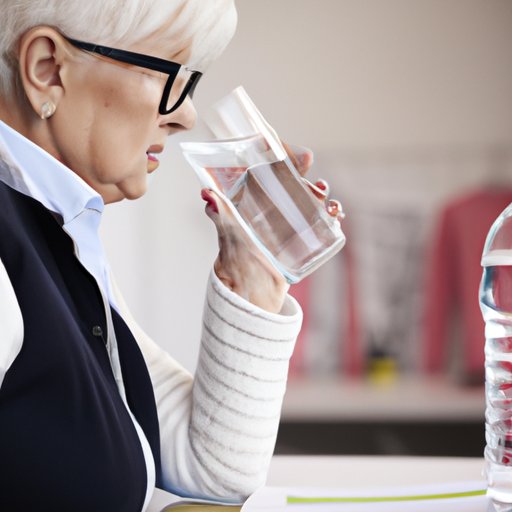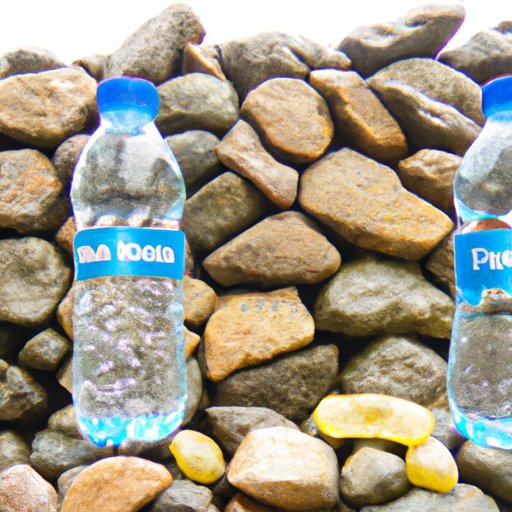Introduction
Mineral water is a type of bottled water that contains various minerals, such as calcium, magnesium, sodium, and potassium. It is often touted for its health benefits, including its ability to help with hydration, weight loss, and digestion. But could drinking mineral water also increase your risk of developing kidney stones? In this article, we explore the potential link between mineral water and kidney stones.

Investigating the Link Between Mineral Water and Kidney Stones
Kidney stones are hard deposits made up of minerals and salts that form inside the kidneys. They can be extremely painful and can lead to complications if left untreated. While there is no definitive answer as to what causes kidney stones, there are certain factors that are thought to increase the risk. These include a family history of kidney stones, dehydration, certain medications, and certain dietary habits.
So, could drinking mineral water be one of those risk factors? Let’s take a closer look at the evidence.
Examining Evidence on Whether Mineral Water Can Cause Kidney Stones
There have been several studies conducted to examine the link between mineral water and kidney stones. One study, published in the American Journal of Clinical Nutrition, found that drinking mineral water was associated with a lower risk of developing kidney stones compared to other types of water. Another study, published in the International Journal of Urology, found that drinking mineral water was associated with a lower risk of kidney stones when compared to tap water or reverse osmosis water.
The results of these studies suggest that drinking mineral water may be beneficial when it comes to preventing kidney stones. However, it is important to note that more research is needed in order to confirm these findings.

Exploring Potential Risk of Drinking Mineral Water
While some studies suggest that drinking mineral water may be beneficial for preventing kidney stones, there is still some concern about the potential risks associated with drinking mineral water. For example, many brands of mineral water contain high levels of sodium, which can be harmful for people with high blood pressure or diabetes. In addition, some brands of mineral water contain high levels of fluoride, which can be toxic in large amounts.
In light of these potential risks, it is important to make sure that you are choosing a brand of mineral water that is low in sodium and fluoride. It is also important to speak to your doctor before making any changes to your diet or lifestyle.

Analyzing the Impact of Mineral Water on Kidney Stones
Now that we’ve explored the evidence on whether mineral water can cause kidney stones, let’s take a look at the potential pros and cons of drinking mineral water. On the one hand, drinking mineral water may help to reduce the risk of developing kidney stones. On the other hand, it is important to be aware of the potential risks associated with drinking mineral water, such as high levels of sodium and fluoride.
It is also important to understand the relationship between mineral water and kidney stones. While drinking mineral water may help to reduce the risk of kidney stones, it is not a substitute for other treatments or lifestyle changes that may be recommended by your doctor. Furthermore, it is important to remember that the exact cause of kidney stones is still unknown, so it is impossible to say for certain that drinking mineral water will prevent them.
Conclusion
In conclusion, there is some evidence to suggest that drinking mineral water may be beneficial when it comes to preventing kidney stones. However, it is important to be aware of the potential risks associated with drinking mineral water, such as high levels of sodium and fluoride. Furthermore, it is important to understand that drinking mineral water is not a substitute for other treatments or lifestyle changes recommended by your doctor.
It is also important to remember that the exact cause of kidney stones is still unknown, so it is impossible to say for certain that drinking mineral water will prevent them. More research is needed in order to better understand the relationship between mineral water and kidney stones.
(Note: Is this article not meeting your expectations? Do you have knowledge or insights to share? Unlock new opportunities and expand your reach by joining our authors team. Click Registration to join us and share your expertise with our readers.)
